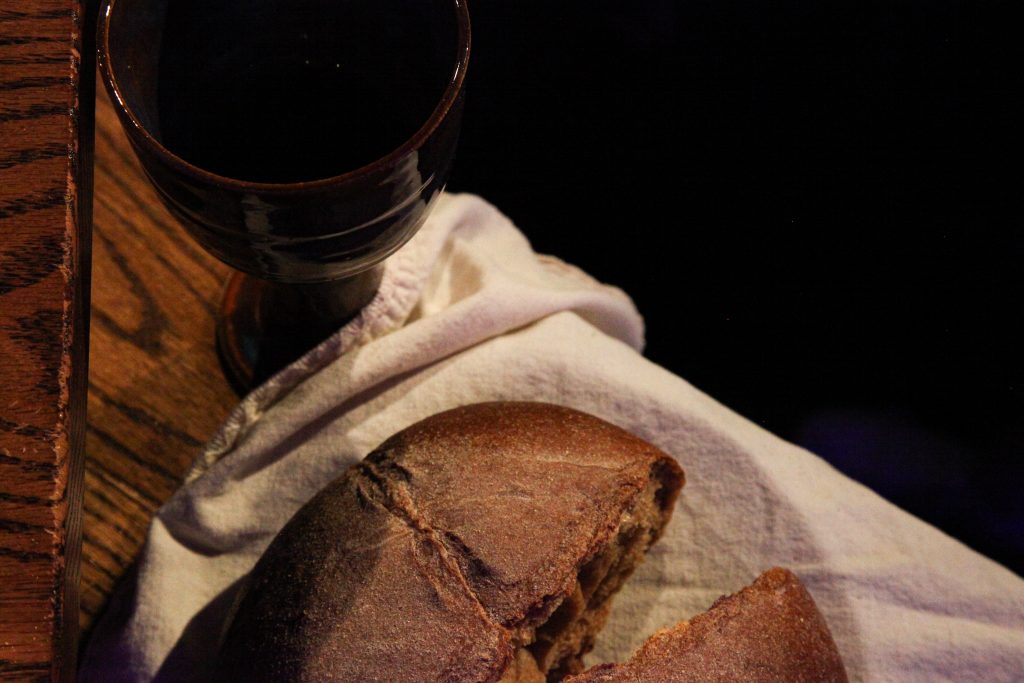Participation in the Lord’s Supper is serious business. At least it is to God. That is not, however, the impression that is given by the way many churches approach this sacrament today. Too often the observance of the Lord’s Supper is tacked on to the end of a worship service, and efficiency, not seriousness, is the main concern.
Consequently, many church members have never been encouraged to think very deeply about the nature of this ordinance, much less about the need to make proper preparations before participating in it. It is easily dismissed as a religious ritual that can be ritualistically observed.
In his instructions to the Corinthians on this subject, Paul issues both a severe warning and a clear admonition about coming to the Lord’s Table. It matters to God. When Jesus said, “Do this in remembrance of Me,” He was issuing a command to His followers to come to His table. Later, through the apostle Paul, He tells us how to come.
In 1 Corinthians 11:27 Paul writes, “Whoever, therefore, eats the bread or drinks the cup of the Lord in an unworthy manner will be guilty of profaning the body and blood of the Lord.” The very fact that it is possible to eat and drink “in an unworthy manner” should be enough to make every thoughtful Christian pause when approaching the Lord’s Table.
When we read that this particular sin makes one “guilty of profaning the body and blood of the Lord,” we should not merely pause but come to a full stop until we make sure we know exactly what Paul means and are certain of the pathway that avoids this serious failure.
In verse 29 Paul explains his meaning, both the sin involved and the consequences that result. “For anyone who eats and drinks without discerning the body eats and drinks judgment on himself.” To commune unworthily, then, is to eat and drink the elements without properly regarding what they represent and the purpose for which Christ calls us to remember His death.
Paul earlier explains that whenever we eat the bread and drink the cup we are proclaiming the Lord’s death (v. 26). The Lord’s Supper is a dramatization of the Gospel. It is a visible testimony of God’s gracious provision for the salvation of sinners. The elements, our Lord teaches us, are designed to call to mind His painful and shameful death on the cross for our sins.
To commune unworthily is to eat and drink the elements without properly regarding what they represent and the purpose for which Christ calls us to remember His death.
The very fact that Jesus instituted this practice for His disciples is an indictment of our own tendency to forget the reality, necessity, and cost of our redemption. It is also a testimony to His wisdom and love in providing us with an ongoing, regular, and dramatic reminder of these saving truths.
Paul’s warning, then, should not be misconstrued to mean that really bad sinners are somehow unworthy to come to the Lord’s Table. Those are the only kind of people who are legitimate candidates. Worthiness is not to be found in some kind of supposed level of personal righteousness in the communicant. Rather, a sinner comes to the table “worthily” when he soberly remembers his sin and the great cost that Christ paid to redeem him from it.
The Heidelberg Catechism makes this point very clear in response to the question, “For whom is the Lord’s supper instituted? For those who are truly sorrowful for their sins, and yet trust that these are forgiven them for the sake of Christ; and that their remaining infirmities are covered by his passion and death; and who also earnestly desire to have their faith more and more strengthened, and their lives more holy….”
To come without serious reflection and intentional remembrance is to eat and drink judgment on oneself. It is to treat the redemptive work of Christ on the cross with contempt.
That was happening at Corinth and Paul says that such unworthy communion was the reason that so many of them were weak and ill, and some had died (v. 30). God killed people for coming to the Lord’s Table in an unworthy manner. We may take it lightly. He never does.
The severity of Paul’s warning underscores the significance of his admonition. Heeding God’s Word at this point is not only a matter of piety, it is also a matter of self-preservation.
Where faith and repentance are being strengthened there will be ongoing renunciation of sins and continued effort to see and find joy and hope in all that Jesus Christ is and has done for us.
To keep us from eating and drinking unworthily, thereby profaning Christ’s death and invoking God’s discipline, Paul commends self-examination. “Let a person examine himself, then, and so eat of the bread and drink of the cup” (v. 28). He admonishes us to set up a court in our own consciences, to initiate an investigation into our own lives (notice that he says each person is to examine “himself”).
What are we to put on trial? Our whole lives. What is the object of our investigation? To see if there is a right relationship to Jesus Christ who shed His blood for our sins. What will this relationship look like? A life of faith and repentance — not in perfection, as Calvin wisely warns us, but in reality.
Where faith and repentance are being strengthened there will be ongoing renunciation of sins and continued effort to see and find joy and hope in all that Jesus Christ is and has done for us. There will be genuine love for and gratitude to God for the work of Christ on the cross.
So in preparation for communing at the Lord’s Table we should examine our attitude toward our own sin and toward Christ’s redeeming work. And we should do so with the clear understanding that we cannot delight in both at the same time. J.C. Ryle puts this very plainly: “Sinners living in open sin, and determined not to give it up, ought on no account to come to the Lord’s Table. To do so is a positive insult to Christ, and to pour contempt on His Gospel. It is nonsense to profess we desire to remember Christ’s death, while we cling to the accursed thing which made it needful for Christ to die.”
In this way the Lord’s Supper serves as a means of God’s grace being strengthened in the life of a believer. Self-examination is not to be a barrier to communion, but preparation for it. “And so,” Paul writes, after we have examined ourselves, let us “eat of the bread and drink of the cup.”
With renewed hatred of our sin and dependence on our Savior, let us take the bread and the cup and with joy and hope commune with our Lord at His table.
Follow Tom Ascol:
-
- Twitter | @tomascol
- Facebook | @tomascol
- Instagram | @thomasascol
















